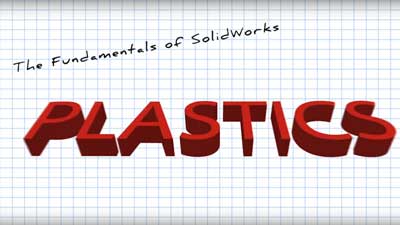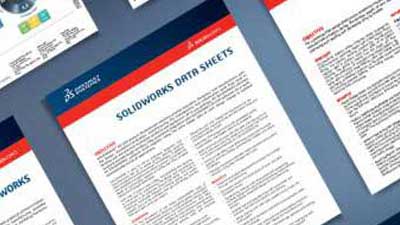SOLIDWORKS Plastics
SOLIDWORKS Plastics offers Computer-Aided Engineering (CAE) simulation tools that predict how melted plastic flows during the injection moulding process—the manufacturing method used to produce more than 80% of all plastics products.
The ability to predict how the plastic will flow allows the prediction of manufacturing-related defects.
By being able to predict these defects, users can change mould geometry, processing conditions, or the plastic material used to minimize potential defects, thus saving energy, natural resources, time, and money.
SOLIDWORKS Plastics
Standard
SOLIDWORKS Plastics Standard brings easy-to-use injection moulding simulation directly to the designers of plastic parts and injection moulds.
It simulates how melted plastic flows during the injection moulding process to predict manufacturing-related defects on parts and moulds.
SOLIDWORKS Plastics
Professional
For plastics part designers, SOLIDWORKS Plastics Professional enables you to optimize parts for manufacturability in the early stages of design.
Easy to learn and use, SOLIDWORKS Plastics Professional is fully embedded within the SOLIDWORKS CAD environment so you can analyze and modify designs at the same time you optimize for form, fit, and function.
SOLIDWORKS Plastics
Premium
SOLIDWORKS Plastics Premium gives anyone who designs or builds injection molds an accurate, easy-to-use way to optimise them. You can quickly create and analyse single-cavity, multi-cavity, and family mold layouts, including sprues, runners, and gates.
You can even balance runner systems and estimate cycle time, clamp tonnage, and shot size, enabling you to optimise feed system design and avoid costly mould rework.
More Information about SOLIDWORKS Plastics
Benefits of SOLIDWORKS Plastics
Avoid Hidden Costs
SOLIDWORKS Plastics products can be used to optimise part wall thickness, gate locations, runner
system size, and layout to ensure the mold works right the
first time, reducing or eliminating the need for rework.
Reduce Manufacturing Defects
SOLIDWORKS
Plastics makes it easy to analyze design iterations at the
earliest stages of product development—when the cost
of change is least and the impact on manufacturability is
greatest. This improves part quality and minimizes scrap
rates.
Reduce Time-to-Market
SOLIDWORKS Plastics helps
to predict and avoid potential manufacturing defects before
any mold tooling is cut, virtually eliminating the need
for time-consuming and costly mold rework and ensuring
project deadlines and ship dates are met on-time and within
budget.
Avoid Inefficient “Islands of Automation”
SOLIDWORKS
Plastics provides automated report generation tools that
facilitate the sharing and interpretation of simulation results,
allowing increased collaboration among development teams
at different sites.
Product Comparison
Features |
SOLIDWORKS Plastics Standard | SOLIDWORKS Plastics Professional |
SOLIDWORKS Plastics Premium |
|---|---|---|---|
|
Ease of Use
SOLIDWORKS Plastics is fully embedded in |
|||
|
Design Data Reuse
SOLIDWORKS Plastics supports SOLIDWORKS materials and configurations for easy analysis of multiple loads and product configurations. |
|||
|
Materials Database
With 4,000+ commercial thermoplastic grades, you can browse and select the desired from the customizable built-in material library. |
|||
|
Meshing
SOLIDWORKS Plastics includes these meshing features:
|
|||
|
Parallel Computing (Multi-Core)
The 3D Solver benefits from a multi-core CPU (multiple threads). |
|||
|
Filling Phase (1st Stage Injection)
Predicts how material fills the cavity. Results include distributions of pressure and temperature within the cavity, and detection of potential short shots and weld lines. |
|||
|
Automatic Gate Location(s)
Defines up to 10 injection locations on the part cavity automatically. SOLIDWORKS Plastics adds injection locations onto the part based on the geometry and optimized balanced fill pattern. |
|||
|
Instantaneous Fill Time Plot
Predicts the plastic flow pattern through the cavity at the end of fill. |
|||
|
Sink Mark Analysis
Predicts the depth of sink marks after the part has been ejected and cooled to room temperature. |
|||
|
eDrawings Support
Results can be exported to eDrawing® |
|||
|
Fill Time
Time needed to fill the whole mould. |
|||
|
Ease of Fill
Displays the quality of the injection process with ‘confidence of fill’ legend. |
|||
|
Results Adviser
User assistant for interpreting results. |
|||
|
Nominal Wall Thickness Adviser
Analyzes the part thickness and locates the high thickness ratio. |
|||
|
Pressure at End of Fill
Displays the maximum pressure to fill the cavity. |
|||
|
Flow Front Temperature
Displays the melt front temperature history. |
|||
|
Temperature at End of Fill
Displays the Cavity Temperature field at the end of fill. |
|||
|
Shear Rate
Displays the shear rate reached at the end of fill to check the injection process quality. |
|||
|
Cooling Time
Estimates cooling time at fill time analysis. |
|||
|
Weld Lines
Displays weld lines formed at locations of the part where two (or multiple) melt fronts meet. |
|||
|
Air Traps
Shows the location where high pressure air may be trapped inside the cavity. |
|||
|
Sink Marks
Displays the location of sink marks. |
|||
|
Frozen Layer Fraction at End of Fill
Displays the fraction of frozen material into the part at end of fill. |
|||
|
Clamp Force
Displays the minimum clamp force for the current injection process. |
|||
|
Cycle Time
Displays the cycle time for the current injection process. |
|||
|
Symmetry Analysis
Avoid simulating both cavities in a symmetrical mould layout, saving computer time for the simulation. |
|||
|
Packing Phase (2nd Stage Injection)
Evaluates the material freezing process in the cavity. Predicts the temperature to evaluate hot spots, gate freeze, and cycle time. Distributions of pressure, stress, and shrinkage results are also available. |
|||
|
Runner Balancing
Determines the runner parameters to balance filling between parts. |
|||
|
Runner Design Wizard
Automates the process of creating common flow control devices and components such as sprues, runners, and gates. |
|||
|
Sprues and Runners
Quickly and easily simulate the impact of the sprues and runners layout. |
|||
|
Hot & Cold Runners
Hot runners are initially filled with hot polymer at the start of the filling simulation. |
|||
|
Multi-Cavity Moulds
Simulates multiple cavities of the same part in the same mould. |
|||
|
Family Moulds
Simulates a set of different cavities parts in the same mould. |
|||
|
Mould Inserts
Include the impact of mould inserts on the simulation |
|||
|
Volumetric Shrinkage
Displays volumetric shrinkage distribution at the end of fill or pack. |
|||
|
Density at End of Pack
Displays density distribution at post-filling end to check the pack phase quality. |
|||
|
Exports STL, NASTRAN
Enables you to export part geometry in STL or NASTRAN formats |
|||
|
Export with Mechanical Properties ABAQUS®, ANSYS, DigiMat®
Exports mesh, residual stress, fiber orientation and material data to run non-linear analysis. |
|||
|
Cooling Lines
Simulates the coolant flowing inside for the mould cooling analysis. |
|||
|
Baffles & Bubblers
Specific cooling line for narrow channel into the cavity. |
|||
|
Conformal Cooling Channels
Cooling passageway follows the shape or profile of the mould core or cavity to perform rapid uniform cooling process. |
|||
|
Runner Domain Category
Domain category assigned to the runner allows easy selection for runner’s conditions. |
|||
|
Sink Mark Profiles
Displays the location of sink marks and their depth. |
|||
|
Mould Temperature at Cooling End
Displays the mould temperature distribution at cooling end. |
|||
|
Displacement Due to Residual Stress
Displays the displacement distribution due to in-mould stress. |
|||



